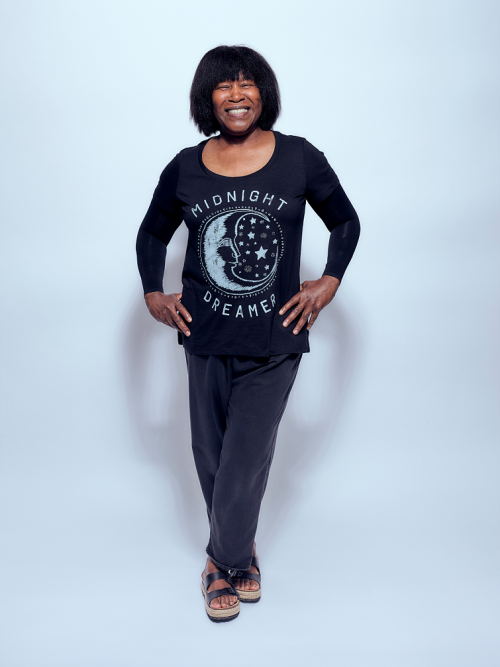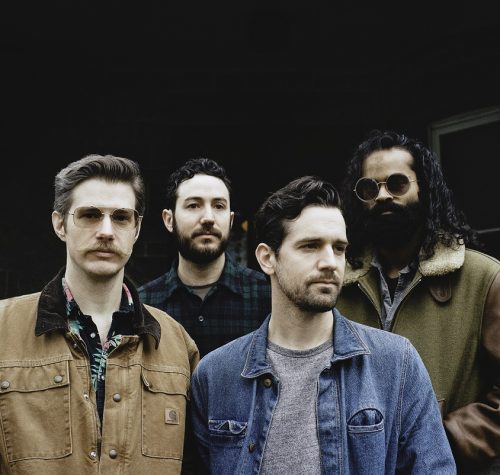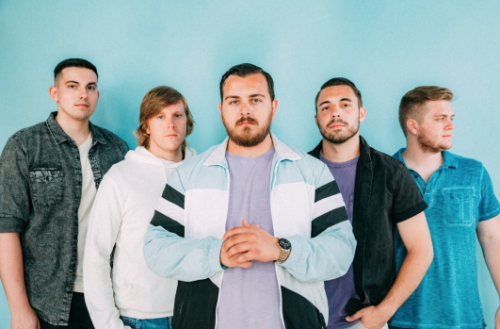Joan Armatrading is a true solo artist. She writes, records and produces her own music, playing all of the instruments herself. So on her new album, “Consequences,” you’re hearing exactly what she was hearing in her head when she created the material: mostly upbeat songs with danceable beats and modern instrumentation.
Listeners have responded enthusiastically, propelling the album to No. 10 in the UK charts right out of the gate, her first top 10 in 30 years. It was released digitally in the U.S. and will hit CD and LP formats here on Aug. 13.
On Saturday, July 31, Armatrading, who moved to England from St Kitts in the West Indies when she was 7, will play her only concert of the year — a livestream from Asylum Chapel in London. Fans will have the opportunity to hear long-time staples like “Me Myself I,” “Drop the Pilot” and “Love and Affection,” as well as new tracks from “Consequences” during the set, where she’s backed by a band.
Armatrading recently chatted with Highway 81 Revisited from London about how she became her own producer and band, why she’s done with lengthy concert tours and how her mom turned out to be her biggest musical influence.
Many of the songs on “Consequences” and throughout your career sound very personal, but you have said that your songs aren’t about you. How can you write love songs when they’re not autobiographical?
First of all, I write in the first person, so that helps. I don’t say “he,” I don’t say “she,” because I want whoever’s listening to that song to be able to say, “That’s me, I can use that,” and that’s quite deliberate, because I don’t want to exclude anybody. So if you take a song like “The Weakness in Me,” the amount of women who say, “OK, I’ve had that experience,” and the amount of men who say, “OK, I’ve had that experience,” if I said “he” or “she,” I would have stopped the men from saying I’ve had that experience or the women from saying I’ve had that experience. If I leave it in that kind of personal way, the “I” just becomes whoever is “it.” And I like that. I like people being able to take the songs and make them be a part of them. I was listening to a song the other day, and it was a chap singing a song, and it was a girl’s song, and he used the girl [pronouns], he sang it as if he was the girl, and it sounded odd, it sounded kind of quirky, and it worked, but it sounded a bit odd as well, because you thought, obviously it’s not you. So that’s why I do that.
And I can’t write all those albums about me, how boring is that? Who wants to be listening to my life story every single album, that’s just stupid. And another thing is if I keep saying I want a private life and I don’t want to discuss it, and then I go and put it all in a song, well that’s nonsense. The two don’t marry, do they? How can you say you want a private life and then put it in a song? It doesn’t make any sense.
On some of your albums, you tend to stick to one genre, but “Consequences” is quite diverse. What was your plan going in?
The way I work is when I am doing an album, I try and think what do I want this album to sound like, what do I want it to be? So I worked with musicians, and I’ve always written and arranged my own songs, I go in with a song, I don’t need the musician, or if I was with a producer, I don’t need them to help the song to become the song. I come in with a verse, a chorus, if you hear a band, it’s because I wanted a band, if you hear a piano, it’s not because somebody said that’s what we should do. So that’s that, and then I started producing myself, even though i really kind of should have had production credit from day one, but anyway, started producing myself in 1986, and because I’d always done my demos myself and engineered everything and played everything and all that stuff [on the demos], I thought at some point I’m going to do that on a record. So in 2003 I decided to do that, and from 2003 till now, I’m the one on the records. 2003 I had a drummer, 2007 I had a drummer, and from then on I started to program the drums myself, from then on it’s really just me. So everything I’m doing, I’m asking, ‘What can I do that’s different to the last thing?’ So 2003, I did everything myself, 2007 I said I’d like to do a trilogy, so I did the blues thing, then the jazz thing, then the rock thing, and then I thought it would be nice to have an album that’s acoustic sounding, so I did “Not Too Far Away,” and this time I thought it would be really good if it was keyboard- sounding, lots of piano, lots of synth-sounding things, not a lot of guitars. Every time I’m thinking what’s the instrumentation going be, and that’s just to keep me interested because I’m always there. (laughs)
The reason I started to produce myself, you know the bassist Pino Palladino? So Pino was doing an album with me, and he said, “You know, Joan, you do realize you already do everything, why do you have a producer?”And I thought, yeah, you’re kind of right, so then I started producing myself.
You’ll be doing a livestream concert on July 31. Why did you decide to do that?
In 2014, -15, I did a tour that was 235 dates. I’ve done tours that long before, and the tours were generally very long. A short tour for me could be about three months, so after that tour I thought, I don’t want to tour like that anymore. So in 2018 I did a three-month tour, and I thought, I don’t even want to do a tour like that anymore. I just want to do the odd gig. So I hadn’t made any plans to do any live gigs in 2021 or 2022, but when the album came out, I thought, I really like this album, I’d love to have people hear the songs. So I decided to do the livestream. This is what we can do these days, because I’m not going to Australia, I’m not going to get to America, I’m not going to South Africa, I’m not going to get anywhere, so let’s do this, this is a way to get people to hear these songs. So I’ll be playing, it’s me on electric and acoustic, keyboard player, bass player, sax player, drummer, and we play songs from all the different albums the way I would if I was on tour, plus the new songs, and people who’ve been to my concert, they know that’s what’s going to happen, they know they’re going to hear everything. And I found this great church, this old church, which I call “characterful,” meaning it needs a bit of work, but the atmosphere is gorgeous, it’s a beautiful place, and that’s where the livestream will be. And just people need to go to my website, and you’ll find the link to buy the ticket and sit in your house for two hours and 52 minutes, whatever it is, and watch the show and have a great time.
When you were growing up, were there certain artists you heard that made you want to be a musician and songwriter?
No. My mother bought a piano, she just thought it was a great piece of furniture. The guys came in and put the piano in, and literally as they were putting the piano against the wall, I was lifting the lid and hitting the keys, and that’s how I started writing songs on the piano. And my dad, according to my mom, he used to be in a band, but he did have a guitar that he would literally hide from me, he wouldn’t let me touch it, I couldn’t play, he wouldn’t play it in front of me — he did play a song called “Blue Moon,” it was quite nice, actually — but I was to have nothing to do with that guitar, and it made me want to play the guitar. So when I saw a guitar in a pawn shop and I said to my mum, “Can I have that, it cost 3 pounds?” She said, “We don’t have 3 pounds,” but she (swapped for it.) I still have that guitar, so my mom is very instrumental in what I’m doing, because she bought the piano and made sure I got the guitar. So it wasn’t because of seeing people, it was because the piano arrived, my dad didn’t want me to play his guitar, which made me want to play, so those are the things that made me start. If you opened the lid of the girls’ (desks) in my school, you’d see pictures of pop stars taped up, if you opened my lid, you’d see nothing. You wouldn’t see any of that in my desk.
 You’re an amazing guitar player. Were you self-taught?
You’re an amazing guitar player. Were you self-taught?
Thank you. Yeah, I’m self-taught. I was just saying this to another interviewer, I started to play when I was 14, and I made my first records and I was playing how I play, but once I started to play with bands live, I would say to the guitarists, “How do you do that? How do you play that?” and they’d say, “Some people never get to a certain stage, or “It’s really tricky to show you this because it’s very difficult to get to that bit,” or “Well, I don’t know if you’re quite ready, and I thought, OK, that’s fine, I’ll work it out, no problem. I could do that. I’ve managed before, I can manage again, that’s no problem. So I just taught myself.
Looking back at your accomplishemnts, including your CBE from the queen or the Brit and Grammy nominations, what are you most proud of?
The one I’m really proud of is not a musical award, it’s my BA honors degree, I got that from Open University for history, and I had to work very hard for that. I had to sit for all the exams and write the thing in the way they wanted it to be written, a certain amount of words they wanted, get it in on the time frame that they wanted, so that was really interesting. I always thought that doing the degree had no bearing on my writing, but I recently came to realize that it did, because when I write, I’m very free, I write whatever I want, however I want, I do it whenever I want to, whereas when you’re doing a degree, you have to be very focused and very hemmed in, and when I did the trilogy, because the first one was blues, that helped me sat, “Don’t go and write a pop song” or “Don’t slip into jazz because this is blues,” and I think that kind of “get it in on time, do these certain amount of words” helped me to write the trilogy.
Next year will be the 50th anniversay of your first album, “Whatever’s For Us.” Are you planning on doing anything to commemorate it, such as a deluxe reissue?
I don’t know, I think it would be nice. At the moment, I don’t know what the plan is, but I think it would be nice to do something. I don’t know what it is, if it is anything. (laughs)
This interview has been edited for length.




Leave a Reply